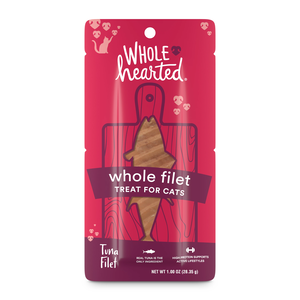WholeHearted Whole Filet Treats Tuna Filet Review

PawDiet has been helping pet owners since 2015. To fund our efforts, articles may include affiliate links; if you buy something through a link, we may earn a commission.
Review of WholeHearted Whole Filet Treats Tuna Filet
According to our most recent data, this product is intended for intermittent or supplemental feeding only.
Review of Ingredients
In our review of WholeHearted Whole Filet Treats Tuna Filet, we'll examine all 1 ingredients and highlight the nutritional contribution of each ingredient.
While the first few ingredients typically dominate the recipe's composition, ingredients in small quantities can still have a meaningful impact on the overall nutritional profile of the recipe.
Tuna is a flavorful and nutrient-rich fish that provides high-quality protein, omega-3 fatty acids, and essential vitamins and minerals to support your cat's overall health and well-being.
Review of Guaranteed Analysis
The guaranteed analysis of the WholeHearted Whole Filet Treats Tuna Filet begins with a minimum crude protein content of 27.00%. Given that the sole ingredient listed is tuna, it is clear that this high protein content is derived from the fish itself. Tuna is an excellent source of protein, which is essential for the growth, maintenance, and repair of tissues in pets. This high percentage reflects the fact that the product is likely made up almost entirely of tuna without significant amounts of fillers or plant-based proteins.
The crude fat content is listed at a minimum of 0.10%, which is quite low. This low fat content can also be attributed to the tuna, which, depending on the cut, can be a lean source of protein. The fact that the product is likely made of pure tuna without the addition of oils or other fatty ingredients keeps the fat content minimal.
Crude fiber is listed at a maximum of 1.00%. Since the only ingredient is tuna, the fiber content is naturally low because animal-based products do not contain dietary fiber. Any fiber present in the treats would likely be incidental and come from the minute, indigestible parts of the tuna that are not protein or fat, such as connective tissues.
Lastly, the caloric content is given as 1090.00 calories per kilogram. This energy content is a result of the combined protein and fat in the product, with the vast majority of calories likely coming from the protein since the fat content is so low. The calorie density of this product is relatively high due to the high protein content, making it a potentially energy-rich treat for pets.

